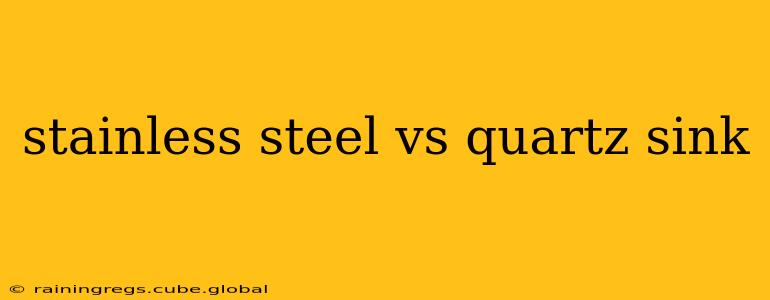Choosing the right kitchen sink can feel overwhelming. Two popular contenders consistently top the list: stainless steel and quartz. Both offer distinct advantages and disadvantages, making the "best" choice entirely dependent on your individual needs, style preferences, and budget. This comprehensive guide will delve into the key differences, helping you make an informed decision.
What are the pros and cons of stainless steel sinks?
Stainless steel sinks have been a kitchen staple for decades, and for good reason. Their durability and affordability make them a popular choice.
Pros:
- Durability: Stainless steel is incredibly resistant to scratches, stains, and chipping. It can withstand heavy use and high temperatures without showing significant wear and tear.
- Affordability: Generally, stainless steel sinks are less expensive than quartz sinks, making them an accessible option for various budgets.
- Hygiene: Non-porous and easy to clean, stainless steel sinks are highly hygienic. Bacteria and other microorganisms don't readily cling to the surface.
- Heat Resistance: Able to handle hot pots and pans directly placed on the surface without damage (although using a trivet is always recommended).
- Variety: Available in various styles, finishes (from brushed to polished), and sizes to suit any kitchen design.
Cons:
- Noise: Stainless steel sinks can be quite noisy when water hits the surface. This can be mitigated with an undermount installation or by using a sink mat.
- Appearance: While many find the sleek, modern look appealing, others may find it less aesthetically pleasing than other materials. Scratches are more visible on a polished finish than a brushed one.
- Maintenance: While easy to clean, regular cleaning is essential to prevent water spots and maintain its shine.
What are the pros and cons of quartz sinks?
Quartz sinks, a more recent addition to the kitchen sink market, are engineered stone sinks that combine quartz with resins and pigments. This creates a visually stunning and highly durable sink option.
Pros:
- Aesthetic Appeal: Quartz sinks boast a luxurious, seamless look, available in a wide array of colors and patterns to complement any kitchen design.
- Non-Porous Surface: Highly resistant to staining and bacteria growth, making them exceptionally hygienic.
- Quiet Operation: Quartz sinks are generally quieter than stainless steel sinks due to their thicker construction and material properties.
- Heat Resistance: Modern quartz sinks are more heat resistant than older versions, but it is still best to avoid placing extremely hot pans directly on the surface.
- Variety of Styles: Available in various shapes, sizes, and designs, including undermount, apron-front, and farmhouse styles.
Cons:
- Cost: Quartz sinks are significantly more expensive than stainless steel sinks.
- Susceptibility to Chips and Cracks: While durable, quartz sinks can chip or crack under impact from heavy or sharp objects.
- Repair Challenges: Damaged quartz sinks are generally more difficult and expensive to repair than stainless steel sinks.
- Maintenance: While relatively low maintenance, regular cleaning with appropriate cleaners is necessary to avoid staining and maintain its shine.
What is the best material for a kitchen sink?
There's no single "best" material – the optimal choice depends on your priorities. Consider these factors:
- Budget: Stainless steel is the more budget-friendly option, while quartz represents a significant investment.
- Aesthetic Preferences: Do you prefer the classic, clean look of stainless steel or the modern, luxurious look of quartz?
- Durability Needs: Both materials are durable, but quartz is potentially more susceptible to chipping.
- Maintenance Commitment: Both require regular cleaning, but stainless steel may show wear and tear more visibly.
Are quartz sinks more durable than stainless steel?
Both quartz and stainless steel sinks are durable, but their durability manifests differently. Stainless steel excels in resisting scratches and dents, while quartz offers better resistance to staining. Quartz is, however, more prone to chipping and cracking from impact than stainless steel.
Which sink is easier to clean?
Both stainless steel and quartz sinks are relatively easy to clean. Stainless steel's non-porous nature makes it simple to wipe clean, while quartz's smooth surface prevents staining. However, regular cleaning is recommended for both to maintain their appearance and hygiene.
Which is better for a busy family?
For a busy family, the choice depends on your priorities. Stainless steel’s durability and ease of cleaning may be more practical, while quartz's resistance to staining might be appreciated.
How much does a quartz sink cost compared to a stainless steel sink?
Quartz sinks are considerably more expensive than stainless steel sinks, with the price difference varying significantly based on size, style, and brand.
By carefully weighing the pros and cons of each material and considering your individual needs, you can confidently select the perfect kitchen sink that will serve you well for years to come.
